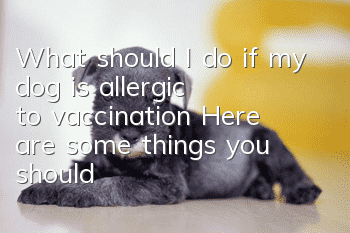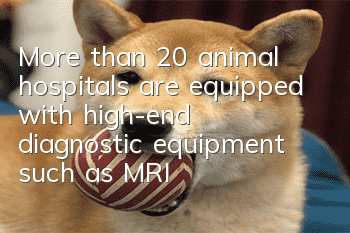What should I do if my dog is allergic to vaccination? Here are some things you should pay attention to before getting vaccinated

How to deal with dog vaccine allergies
Dogs with general allergies usually develop symptoms about 10 minutes after the injection. The main symptoms are depression, dull eyes, slow reaction, weak limbs, weakness in movement, and breathing. Deep and slow. For dogs with general allergies, you only need to let them rest well. Generally, no medication is needed, and they can return to normal after 1 hour.Dogs with severe allergies usually develop symptoms within 2 minutes after injection. The main symptoms are elevated body temperature, rapid heartbeat, rapid breathing, mental stress and then listlessness, dull eyes, disheveled coat, cold nose, and neck. Feeling weak, limbs standing unsteadily and in a crawling and lying position. For dogs with severe allergies, desensitization therapy should be carried out as soon as possible. The dog should be injected with 1 ml of chlorpheniramine injection subcutaneously and intravenously with 10% calcium gluconate (10 ml per kilogram of body weight). Relief will be achieved after 20 minutes, otherwise it can be repeated. Inject chlorpheniramine until symptoms resolve.
So dogs generally should not leave the hospital immediately after being vaccinated. It is best to observe the dog in the hospital for more than half an hour before leaving.
The reasons why dogs are allergic to vaccines
1. Dogs are allergic. Before injecting vaccines into dogs, a health check-up must be carried out.2. If the dog is not in a good mental state, you can wait until the dog calms down before giving the injection.
3. There is latent virus infection in the dog’s body.
4. If there is a problem with the vaccine, you must choose a vaccine with a national approval number, vaccine business qualifications, and a cold chain guarantee of 2-8°C.
Precautions for dog vaccination
1. If you have just bought a puppy from the dog market, it is best to raise it at home for 2 weeks and observe if there are no abnormalities before getting vaccinated. This can avoid interference with the immune plan due to physical decline due to stress response or the incubation period of the disease.2. Dogs with unhealthy physiques, such as colds, allergies, severe calcium deficiency or parasitic infections, should be immunized after recovery to avoid unsatisfactory immunity.
3. Dogs that are too young (less than 6 weeks old) should not be vaccinated too early due to the presence of maternal antibodies in their bodies.
4. Veterinarians must conduct a health check before injecting vaccines into dogs. Dogs with high body temperatures or weak dogs should not be vaccinated and wait until they recover.
Random articles
- What to do if a dog is poisoned
- Which dogs are the most loyal to their owners? These dogs will sacrifice themselves for you!
- Can dogs be checked in? This is a safer and more convenient method!
- Can dogs eat apples? There are many benefits to dogs eating apples!
- What causes intussusception in dogs? Owners should understand these reasons!
- The dog is thin but in good spirits. The dog’s nutrition may be robbed!
- Does a dog know when a person is pregnant? A dog’s nose is very sensitive!
- Why are dogs afraid of hospitals? Owners should pay more attention to their dogs’ emotions!
- Why do dogs like to sit on the sofa? It’s not something the poop officials allow!
- What should I do if my dog has a fever for a long time? Repeated fever is definitely not normal!



